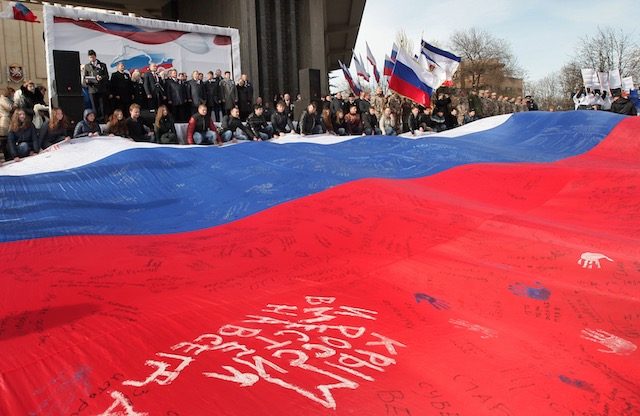SUMMARY
This is AI generated summarization, which may have errors. For context, always refer to the full article.

SEVASTOPOL, Crimea – Russia on Monday, March 16, kicked off 3 days of celebrations in Crimea to mark a year since it annexed the peninsula in a historic shift blasted by the West and Ukraine as an illegal takeover.
Firework displays and concerts across the Black Sea Peninsula feted the first anniversary of a controversial referendum under the eye of elite Russian troops in unmarked uniforms who had swarmed key sites in Crimea two weeks earlier.
Pro-Russian authorities said nearly 97% of Crimeans voted to leave Ukraine and become part of Russia, but with no independent observers allowed the poll was widely dismissed abroad.
Two days later Putin signed a treaty incorporating Crimea into Russia, sending Moscow’s ties with the West into a tailspin but boosting his popularity at home to record highs that official statistics said hit 88 percent last week.
As the white, blue, red Russian flag fluttered throughout the peninsula on Monday, the European Union criticized the growing militarization of Crimea, the home of Russia’s Black Sea fleet, under Moscow’s rule.
“One year after the holding of an illegal and illegitimate referendum of Crimea and Sevastopol by Russia, the European Union is firmly committed to the territorial integrity of Ukraine,” EU foreign policy chief Federica Mogherini said in a statement.
‘We live poorly’
Across Crimea, the day began with a special lesson taught in all the peninsula’s schools on “Russia and Crimea’s shared fate.”
To many Russians, Crimea’s takeover by Russia is historical justice after Soviet leader Nikita Khrushchev handed the strategically important peninsula to Ukraine in 1954 in what was then a largely symbolic move since Ukraine and Russia were both part of the USSR.
Putin’s envoy to Crimea, Oleg Belaventsev, hailed what he called a “historic referendum” in a special session of the peninsula’s parliament.
Several thousand people gathered in the centre of the port city of Sevastopol for a 4-hour-long concert and fireworks display.
However the crowd – much smaller than that which celebrated the referendum’s results a year ago – was not particularly enthusiastic as officials gave speeches and few, when prompted, took up the chant: “Sevastopol, Crimea, Russia.”
An increase in prices due to the collapse of Russia’s ruble, an effective economic blockade of the peninsula by Ukraine and the West, which has slapped the region with economic sanctions, appeared to have dampened enthusiasm for the upheaval.
“We are glad we have joined Russia,” said engineer Ivan Grigorevich, 65, who like others at the square has also grown disgruntled with Crimea’s leaders.
The authorities “are stealing a lot. There’s no one in charge of the city. Under the Ukraine regime it was much cheaper, I could live on 300 hryvnias. Now 20,000 rubles is just nothing,” he told Agence France-Presse.
Tatiana Tsarevna, 60, also bemoaned leaders “misbehaving behind Putin’s back”.
“The elderly are treated badly and have to suffer standing in queues for pensions. We live poorly.”
‘Russia, peace and stability’
In a documentary broadcast on Sunday, March 15, Putin presented himself as the savior of Crimea forced to deploy troops to prevent a war with “nationalists” in Kiev. He also said that at the time he had prepared to put his nuclear forces on alert in case of western intervention.
The film showed the lengths he was willing to go to in Crimea after pro-Western protesters in Kiev deposed Moscow-backed president Viktor Yanukovych in a street revolt.
“I think no one was in the mood to start a world war,” he said, hailing the work of thousands of special forces, land, air and sea troops who intervened in Crimea.
At the time, the Kremlin had initially denied the men in unmarked uniforms were Russian troops.
The annexation of Crimea was a critical event in the Ukrainian crisis which many believed triggered the separatist uprising in eastern Ukraine where over 6,000 have since been killed in fighting, according to UN figures.
The Kremlin has likewise denied accusations it has troops in eastern Ukraine and that it is arming the rebels, despite mounting evidence from journalists and independent military experts of Russian weapons systems and personnel in the war zone.
In the documentary, Putin insisted his takeover of Crimea had prevented the bloodshed seen in eastern Ukraine.
“The choice was obvious: Ukraine, blood and war, or Russia, peace and stability,” Crimea’s leader Sergei Aksyonov echoed in a speech to officials in the regional capital of Simferopol on Monday.
‘How long will Russians pay?’
But with Western sanctions hitting Russia’s economy hard, the popular Moskovsky Komsomolets daily wondered if the price of having Crimea back in the fold was worth it.
“From the point of view of an average European, Russia is a dangerous and incomprehensible force which refuses to live by the rules and constantly threatens to destroy the cosy little world built by the European Union,” read an editorial in the paper.
“Crimea is ours, of course. But how long will Russia have to keep paying for this and how many zeroes will there be in the final sum, not even Putin knows.” – Oleg Leus, AFP / Rappler.com
Add a comment
How does this make you feel?
There are no comments yet. Add your comment to start the conversation.